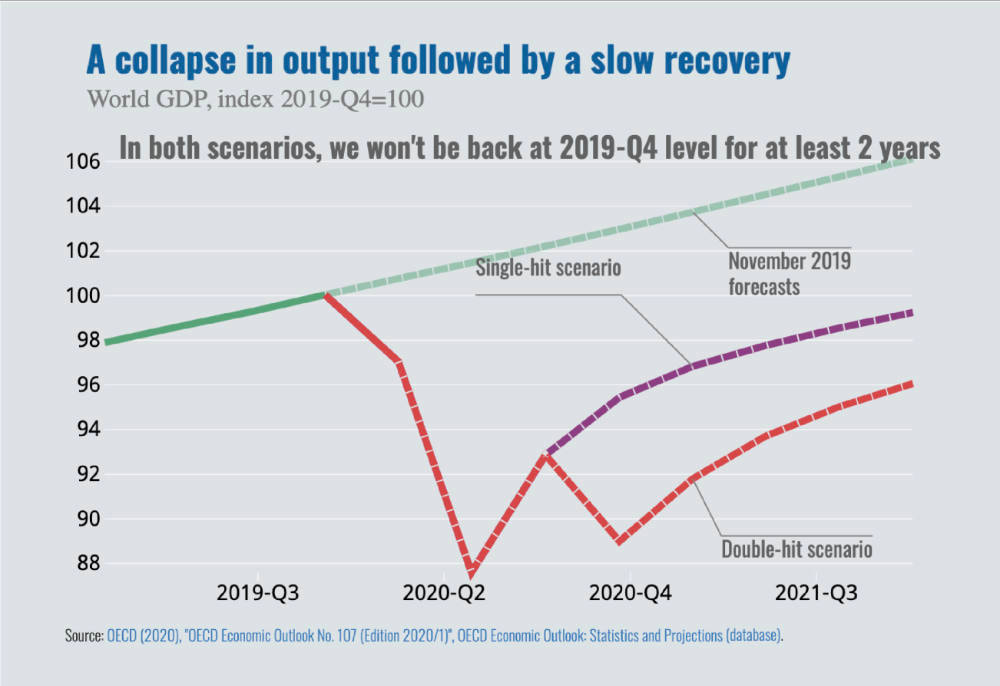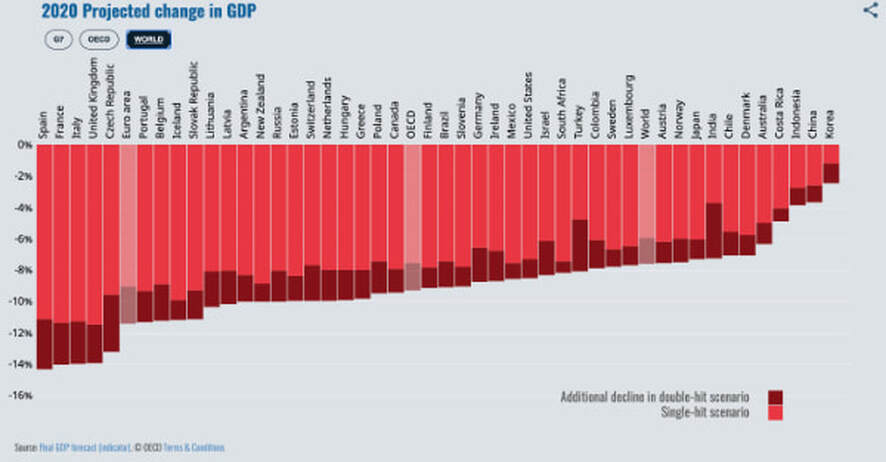- Home
- NEWS
-
PRACTICE
-
MARKETING
- How to write an Artist's Statement >
- How to write an Artist's Resume or CV >
- How to sign a painting, drawing or fine art print
- Business Cards for Artists
- How to write a press release for an artist
- The Private View Invitation
- Publicity for Juried Exhibitions
- Websites for Artists >
- Image & Video sizes for Social Media Sites
- How to be mobile-friendly
-
SELL ART
- FRAME ART
-
SHIP ART
-
COPYRIGHT
-
MONEY & TAX
- About + Help
- BANKING
If you want to be an artist in a recession....
|
This page covers:
|
There's a few things you NEED TO KNOW - particularly if you've never ever had experience of a serious global recession before.
|
What is a recession?
In very simple terms, a recession is when a country's economy shrinks.
Below the Organisation for Economic Co-operation and Development (OECD) has projected
- Normally, a country's economy grows and governments focus on making sure it can grow, create more jobs and more income for more people
- When the economy shrinks - in terms of Gross Domestic Product (i.e. how the economy is measured) for two consecutive quarters then a country is in a recession.
- the results of a recession are:
- companies close down and/or cut jobs
- people lose their jobs and associated income
- people lose confidence in the future
- the income available for discretionary purchases (eg art) drops like a stone across most income brackets
Below the Organisation for Economic Co-operation and Development (OECD) has projected
- how long it will take to recover to where we were at the end of 2019
- the impact of Covid-19 on different countries and geographical blocks - in terms of decline from a single hit pandemic (red) - and with the damage caused to the economy by a second wave (crimson).
ADVERT
What happens to artists and art businesses in a recession?
The major implication for artists of the recession is going to be a BIG REDUCTION in available cash to spend on art - which makes selling art a major challenge |
galleries serving the low/middle end of the market (ie £200+ prices) are finding the going tough and a number are 'shutting up shop'. |
How does this all affect art?
Well anything which impacts on homes and stimuli for changes in decoration (like house buying and selling) and the amount of 'free' money which is around to spend on and invest in art is likely to have a very major impact on sales of artwork in 2008.
Plus, let's face it, at the end of the day unless you're involved in high end investment art, most of the art which is bought is actually purchased to decorate a home whether or not the artists who produce it would like it be called "decorative art". Which means both galleries and sales can be very vulnerable to economic shifts. It's just not the sort of thing which people buy when their financial status is uncomfortable or possibly under threat.
What should artists do about marketing their art in a recession? (23 January 2008)
|
You MUST KNOW WHAT TO EXPECT!
In 2008, the art world crashed with the banking collapse. Lots of artists had to work out how to cope with the fact that
The articles in the reference section are ones which highlight what was predicted, what happened and what artists did |
REFERENCE:
|
|
In 2020, an even bigger recession is riding in on the back of the coronavirus pandemic
|
REFERENCE:
The Pandemic Recession: Likely Impact on Art Sales and Artists | Making A Mark - this covers:
|
|
SEARCH QUERIES RE. ART IN A RECESSION
|
10 BENEFITS OF A RECESSION
|
ADVERT
What should artists do in a recession?
Those of us who've been around for a while know that every time recession happens, the art world is impacted in basically the same way. In other words, learning from the past is a great way to prepare for the future.
Alan Bamberger | ArtBusiness.com
Alternative "and/or" strategies for artists
trying to remain afloat and survive in an enormous sea of uncertainty
trying to remain afloat and survive in an enormous sea of uncertainty
- assess market for your type of art
- move upmarket
- move out of galleries
- get into direct selling
- invest in effective marketing
- manage your debt
- create opportunities for the risk averse to feel good
|
ASSESS MARKET FOR YOUR ART
While my galleries aren't "dumping" me, my work is being edged out by chance (closing galleries) or choice (customers opting for easy, affordable, decorative work). |
MOVE UPMARKET
People with money still have money throughout the recession unless their company collapses. The one art market which does not not tend to change much during a recession is that for high end art - with prices in five,six and seven figures |
Our data reveals that the value of even some extremely well-known artists’ work can be adversely affected by market vicissitudes, and that the exact time when a collector decides to go to auction can have a major impact on price performance.
Artsy - Why Certain Artists’ Markets Can Weather a Recession While Others’ Flop
|
MOVE OUT OF GALLERIES
The absolutely critical issue is to get art out of galleries fast if it shows clear signs of being in trouble.
|
ENGAGE WITH COLLECTORS & SELL DIRECT
A lot of artists spent lockdown working very hard on doing one or more of the following in order to increase art sales via direct selling:
In the main those artists who have been through the 2008 recession moved fastest because they remember what the impact is like on income and how long the recession effect can last. |
Over my career, I’ve lived through six recessions and learned two big lessons:
1) fear and anxiety will paralyze you if you are not prepared, and
2) a crisis that forces you to stop, just stop, can be a meaningful moment to learn and prepare for your next stage.
Bruce Nussbaum
|
INVEST IN EFFECTIVE MARKETING
see Marketing Art and Selling Art Sections Given the constraints of travel and meeting people, this time around the recession means that artists simply MUST develop skills around marketing using technological means and social media |
MANAGE YOUR DEBT
It's ESSENTIAL that you understand:
You might also like to review the legal repercussions of trading while "breaking the law" - if you want to avoid potentially stiff penalties
|
REFERENCE:
- How to recession-proof your creative practice - An artist’s guide to surviving economic precarity, written by Bruce Nussbaum with illustrations by Darren Shaddick.
- Selling Artwork in a Weak Economy | ArtBusiness.com -
- Why Certain Artists’ Markets Can Weather a Recession While Others’ Flop | Artsy - looks at what happened in the art market for top artists - and who fell and who gained
- What Lessons Can the Art World Learn From the Last Recession? | Observer (August 2019 - i.e. pre Pandemic)
|
INDEX of Art Business Information for Artists website
PROFESSIONAL PRACTICE: How to be a successful artist |
ADVERT
|
ABOUT ART BUSINESS INFO. FOR ARTISTS
This website aims to provide a compendium of resources about the art business for artists. Please read "PLEASE NOTE"
It helps artists learn how to do better at being business-like, marketing and selling their art and looking after their financial security.
This website aims to provide a compendium of resources about the art business for artists. Please read "PLEASE NOTE"
It helps artists learn how to do better at being business-like, marketing and selling their art and looking after their financial security.
|
Copyright: 2015-2021 Katherine Tyrrell | Making A Mark Publications
- all rights reserved If you've got any suggestions for what you'd like to see on this website please send me your suggestion
|
PLEASE NOTE:
1) Content and the law change all the time. It's impossible to keep up with it if you're not working on the topic full time. 2) I research topics carefully. However, I am totally unable to warrant that ANY and/or ALL information is
|
3) Hence all information I provide comes without any LIABILITY whatsoever to you for any choices you make.
4) This website is FREE FOR YOU but not for me. Links to books are Amazon Affiliate links. Buying a book via this website means I get a very small payment which helps to fund and maintain this website. .I much appreciate any support your provide. Adverts are provided by Google AdSense - but the adverts do not mean I endorse the advertiser. |
- Home
- NEWS
-
PRACTICE
-
MARKETING
- How to write an Artist's Statement >
- How to write an Artist's Resume or CV >
- How to sign a painting, drawing or fine art print
- Business Cards for Artists
- How to write a press release for an artist
- The Private View Invitation
- Publicity for Juried Exhibitions
- Websites for Artists >
- Image & Video sizes for Social Media Sites
- How to be mobile-friendly
-
SELL ART
- FRAME ART
-
SHIP ART
-
COPYRIGHT
-
MONEY & TAX
- About + Help
- BANKING

